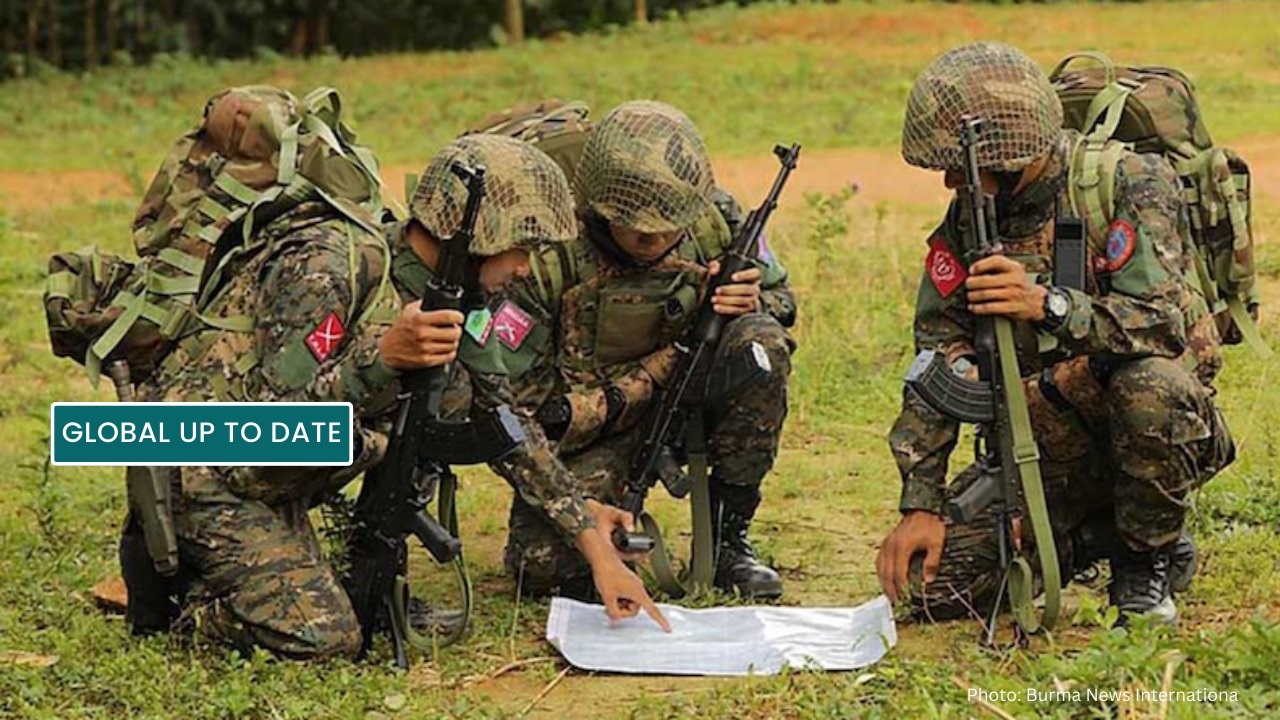Operation 1027: A New Ray of Light for Myanmar's Resistance
Roman Uddin | 29 November 2023
Myanmar, a Southeast Asian country surrounded by the borders of India, China, and Bangladesh, is one of the few maps in the world that are blood red most of the year. Despite being steeped in Buddhism, a religion that embodies the vision of peace promoted by Gautama Buddha, Myanmar has faced numerous defensive wars, riots, tyranny, and torture throughout its history since gaining independence in 1948. Ever since gaining independence, the people of this country have been striving for democracy, human rights, and freedom of speech, but progress has come to a standstill under the threat of the military regime. Aung San, the father of the nation, was assassinated before Myanmar gained independence, and the military has held power in various ways since then.
Due to the undemocratic process, dictatorship, and the violation of human rights, the international community-imposed sanctions on the Myanmar Junta Government. When Myanmar's economic situation began to deteriorate under the sanctions of foreign countries, especially western nations, they released the leaders of various political parties who were imprisoned. To convince the international communities, they declared 7 steps of the democratic process and formed a constitution. As a part of their process, Aung San Suu Kyi, who had been under house arrest for a long time, was also released. Later, her party came to power through the 2015 elections, and the people of Myanmar experienced democracy under her rule, though there was still a remarkable dominance of the military. However, in 2021, when she won for the second time, the military seized power and arrested Suu Kyi again, crushing Myanmar's democratic journey once more.
This junta government has been running the country dictatorially for ages, subjecting various ethnic groups from various states, including Shan, Kachin, Rakhine, Sagaing, and Mandalay, to inhuman oppression, torture, and tyranny. Many times, over the past few decades, armed groups from these regions have fought separately with the Tatmadaw forces, the armed forces of the junta government, but to no avail. A change has been noticed in the present time. These armed groups from different states of Myanmar have formed an alliance. The Arakan Army, the Myanmar National Democratic Alliance Army, and the Ta'ang National Liberation Army have formed the Three Brotherhood Alliance.
The Three Brotherhood Alliance is already successfully carrying out their “Operation 1027,” conducting this operation throughout the month of November 2023. They jointly launched the anti-regime operation by attacking and seizing regime bases and towns across northern Shan, Kachin, and Rakhine states, as well as the upper reaches of Sagaing and Mandalay regions. Several resistance organizations, including the People's Defense Force groups (PDFs) under the civilian National Unity Government (NUG), the Karenni Nationalities Defense Force (KNDF), and one of the country’s most powerful ethnic armed organizations (EAOs), the Kachin Independence Army (KIA), are coordinating with the Brotherhood Alliance’s operation. Within a month, over 224 junta bases and seven towns across northern Shan, including some strategic centers on key Myanmar-China trade routes, have been seized from the junta.
Since the operation's launch, the resistance groups have managed to block many sections of two of the country’s main trade arteries - the Mandalay-Lashio-Muse Road and the Mandalay-Lashio-Chin Shwe Haw Road, both of which pass through northern Shan State.
In the earliest days of the operation, the rebel groups managed to take complete control of Chin Shwe Haw, a trade hub on the Chinese border. Later, they seized another strategic town, Hseni, where the Lashio-Muse and Lashio-Chin Shwe Haw trade routes converge, as well as another trade gate - Kyin San Kyawt on the China border in Muse Township.
The most remarkable thing is that China, the closest friend of the junta government, is not helping them in this difficult time. Many believe that China is secretly supporting and supplying the rebel group with weapons. Meanwhile, Tatmadaw forces in various regions are surrendering to the resistance groups. In the overall situation, Army General Min Aung Hlaing has already expressed the fear that the country will be divided into different parts.
As the war rages on, it will be difficult for the junta government to retain this power. However, if the junta government is ousted, there are many fears about what Myanmar will look like after. The armed groups that are now uniting against the military Tatmadaw forces have conflicts among themselves, and not all of them have the same goals. Some want power, some want autonomy, and some want a free state. Therefore, it is challenging to predict where the future of Myanmar is headed. However, it is conceivable that the future of the junta government is going to be very difficult.
Roman Uddin is a Research Associate and Youth Outreach Program Coordinator at CGS
